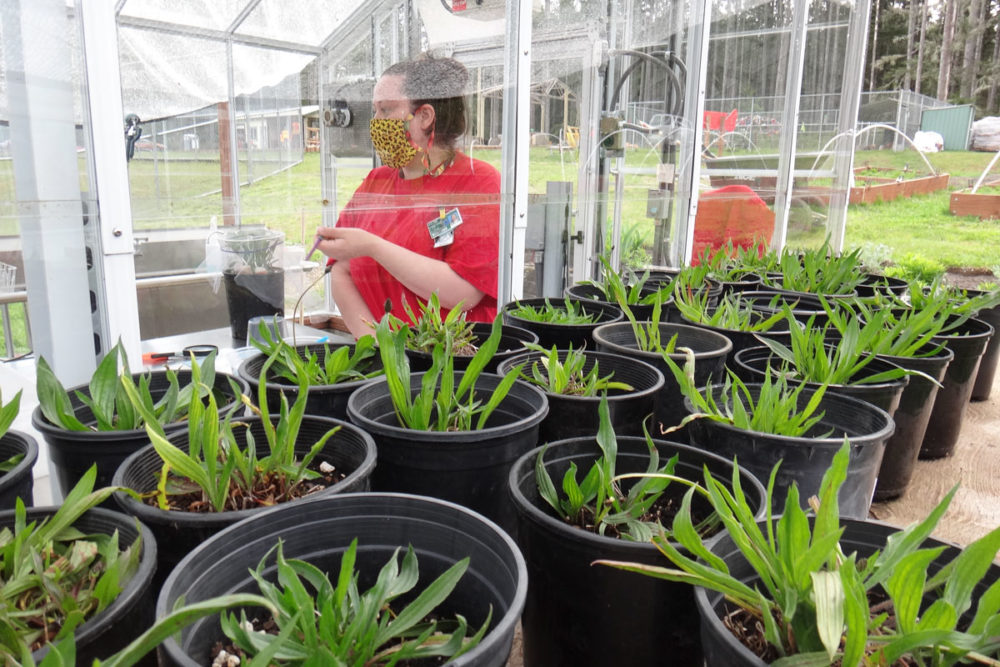By Erica Benoit, SPP Special Projects Manager and Kelli Bush, SPP Co-Director
We at SPP are all deeply aware of how difficult this past year has been. It has been especially hard for the people living and working in prisons. We acknowledge the loss and suffering experienced by incarcerated people, their families, and corrections staff. Our thoughts are with our fellow humans everywhere—may we all have better days ahead.
Like many organizations, SPP has also faced a slew of competing challenges. Over the past year we have shifted to working remotely, navigated major staffing changes resulting in a smaller team size, and supported multiple team members through health issues. We are continually processing the overall health and safety impacts of COVID-19 and loss of in-person interaction with students, partners, and our small team at Evergreen. Despite these challenges, we are hopeful for better horizons. We are reaching out to share how SPP is making the best use of these challenging times; we are simultaneously practicing patience and resilience every day.
Human health and safety are our top priority over program operation. As a result, the vast majority of SPP programs have been suspended due to the COVID-19 pandemic. We are still supporting operation of a few programs, but only where interactions with SPP staff can be masked, socially distant, primarily outside, and with access to proper resources for hand washing and cleaning high touch surfaces. Programs which have continued under these circumstances and in accordance with approved COVID plans include the prairie conservation nursery at Washington Corrections Center for Women (WCCW), the Taylor’s checkerspot butterfly program at Mission Creek Corrections Center for Women (MCCCW), and a few peer-led education programs at various facilities.

Keegan Curry from SPP safely helps out with the Taylor’s checkerspot butterfly program at MCCCW. Photo by Marisa Pushee.
Despite major program suspensions, SPP staff have still been hard at work on projects in three main focus areas: remote education, proposal development, and policy/guidance work. We hope that the behind-the-scenes work done in these areas will have lasting benefits when programs are able to safely restart. Brief details on some specific projects (most still in progress) are provided below.
Remote Education
Beekeeping
- Curation and delivery of monthly educational packets to all facilities
- Development of higher-level beekeeping certification (in progress)
- Pilot course at Stafford Creek Corrections Center (almost complete)
- Planning for improvements to course materials based on pilot feedback
- Developing practicum component
- Completing development of certificate
- Planning for additional courses at Coyote Ridge Corrections Center (CRCC) and WCCW
Ecology Curriculum
- Developing education materials on ecological topics with the help of the University of Washington – Tacoma Restoration Ecology faculty and students
Prairie Conservation Nursery
- Standardizing education materials and adapting for remote access (i.e. remote presentations, limited contact education, and/or peer-led components)
Peer-led Composting Curriculum
- Identifying funding and planning for development of curriculum for statewide use
Solar Energy Education
- New partnership with Olympia Community Solar that allows donors to sponsor solar energy education packets to be sent to prison facilities
Proposal Development
Funding
- Provided budget for potential new education and training program in partnership with WA Department of Fish and Wildlife
- Developed and submitted a funding proposal to complete the next phases of gardening and composting course and to pilot in another state
- Developed and submitted a funding proposal to expand Evergreen education in prisons
Planning and Organization Improvements
- Improving processes and guidance related to development of education materials
- Developed new SPP program planning templates to improve operations and clarity among partners
- Identifying more reliable mechanisms for delivering remote education
- Developed general partnership resource document for guiding all types of successful prison programs among multiple partners (in progress)
Policy/Guidance Work
- Tracking and testifying in support of HB1044 Pathways to Post-Secondary Education in Prisons
- Working with Washington Department of Corrections and education organizations to develop policy and guidelines for successful peer-led programs in prison (in progress)
- Working with The Evergreen State College to draft new policy to that will support granting college credit to currently incarcerated program participants successfully completing SPP certificated internship programs
- Research to address barriers limiting access to fresh produce in prison and considering development of food handling education to improve ability for prison kitchens to utilize fresh produce from facility gardens (longer-term project)
Lastly, we are actively drafting our latest Annual Report, which is expected to be published sometime in spring. Be on the lookout for this report for full updates regarding SPP programs and initiatives from July 2019 through December 2020.


